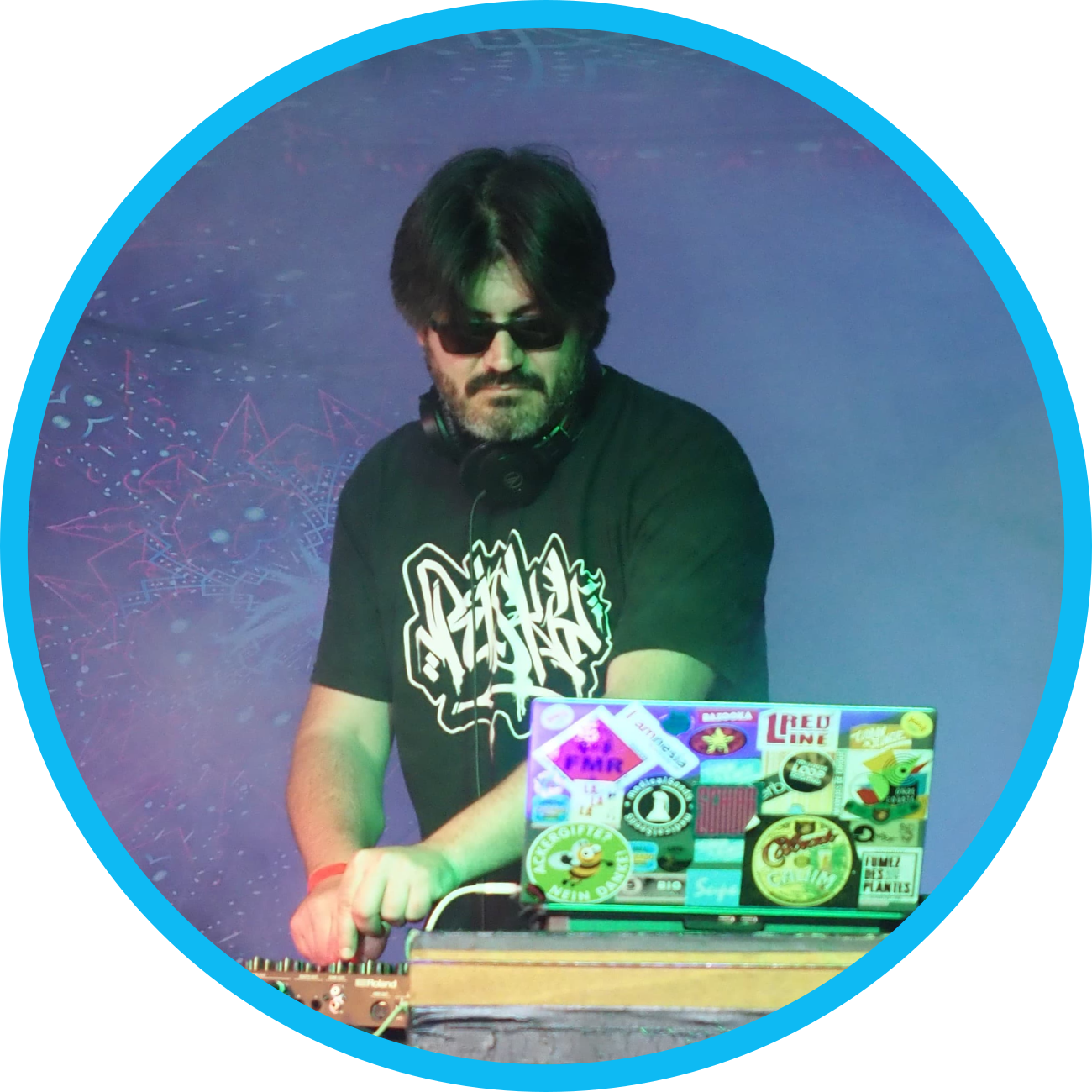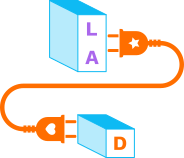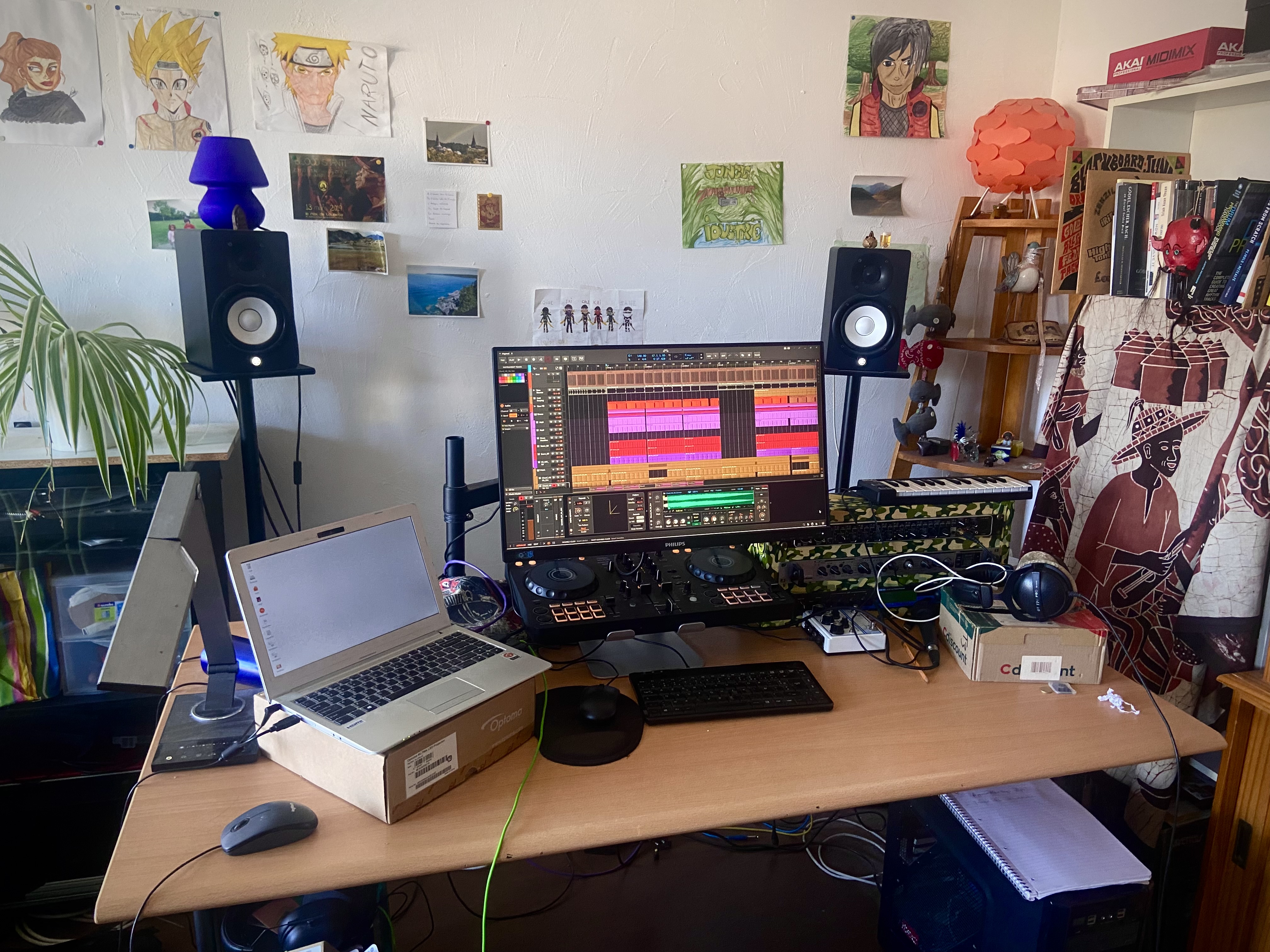Linux Audio Development (LAD)
Rhizome Industrie
Linux Audio artist interview with Rhizome Industrie

This interview was conducted by Amadeus Paulussen in 2025.
Thank you for participating and for sharing your Linux journey with musicians and producers who are interested in Linux or already working with Linux! 🙌
My first question is also a request: Would you mind introducing yourself briefly to our readers? How did you get into music and how long have you been doing it?
Hi, and thank you for having me on the show!
I'm a producer and DJ who is into dub, deep dubstep, and drum & bass.
I discovered electronic music at a very young age with the album The Man-Machine by Kraftwerk we had at home. Although I was 3 or 4 years old, I can still vividly remember the emotions brought by the otherworldly sounds I could hear. As a teenager, I was listening to bands like The Communards and The Cure, then got into punk before getting into reggae and dub. I could also hear some acid techno late at night on local radio. Another revelation was when a record shop owner sold me a CD of Divination, an ambient dub project by Bill Laswell.
Then, I met a friend in high school who had traveled to the UK and introduced me to triphop, jungle, and drum and bass.
I started mixing on vinyl around 1998 and started producing around 2000, when my parents bought a computer for the house and a friend from university introduced me to audio software. Between 2006 and 2020, I didn't do much, as I was busy with other things. So, I can say I have been doing it for roughly 10 years over the course of 25 years.
Next, I'd be very interested to know how long you've been producing your music with Linux and what your main motivation was for going down this route.
My first experiments with music production on Linux were around 2006, but that was also the time when I gradually stopped making music. I played with early versions of Ardour, but mostly enjoyed using seq24, a minimalist, pattern-based MIDI sequencer which isn't maintained anymore, at least under that name. I was using it to drive hardware synths or sound fonts loaded in FluidSynth. Then, I was mixing and adding creative effects using hardware.
When I came back to music production during the pandemic, it was clear that I wasn't going to use Windows, so I got an Akai MPC (which happens to run on a Linux kernel internally!). I also started dabbling with Ardour, but was a bit frustrated by the user experience. I felt that the resources I could find, including the manual, were geared toward experienced producers who wanted to switch to Linux. I was already a Linux user, and I wanted to learn how to use a good DAW. That's when I found Bitwig, which I have been using since 2022.
Can you tell us a little about what the switch to Linux was like for you, whether you had to accept any losses and whether you had to learn a lot?
For me, switching to Linux was tightly related to a career choice. I was a sociology student when I met another student who was already into Linux and coding. He showed me Linux and explained the Open Source principles. I liked the free software mindset and was looking for a way to earn a living, so I took a broadband internet connection and started to learn system administration and coding. That's how I've been paying the bills since. It was a lot of learning, but in my case, it went way beyond using it for personal needs.
So, I have never been in the situation of a musician with an established workflow who makes the switch to Linux. I had switched to Linux already for other tasks and had to find a way to produce music.
Would you like to tell us a little about your current setup (hardware and OS, DAW, plugins, etc.)?
I have a no-name laptop, which came pre-installed with Ubuntu, and a second-hand desktop, on which I also installed Ubuntu.
For production, I use Bitwig, Vital, and AudioThing plugins. The plugins I use the most are Type A, Springs, and Wires. I also own a Behringer Neutron and a couple of hardware effect units, but I don't use them much.
I do my DJ sets using Mixxx and a DDJ-FLX4 controller.
My studio is also my home office, and I'm not a tidy person, so it doesn't look nice like some of the other artists you interviewed! :D
What do you currently miss when it comes to making music with Linux? Hardware, software, plugins—are there things you would like to have that are not currently supported by Linux?
Once thing that comes to mind is a good looking loudness meter. At some point, I had setup Youlean Loudness Meter with yabridge but it kept breaking when updating my system so I gave up. I now use an old free version of LUFS Meter from Klangfreund that runs on Linux natively, but it's not pretty.
Sometimes I'd like to experiment with Serum, if only to find out if it's worth it compared to Vital or the Bitwig Grid. I'd like to try things like Soothe 2 or Ozone. Maybe they work with yabridge, but I prefer to spend time making music with what I have rather than trying to get Windows plugins to work on Linux.
If you could change something about the “Linux rules” to make it easier for newcomers to get started with Linux, where would you start and what would you change?
It's hard for me to say, because I have been using Linux for such a long time. The command-line is my second home. One thing I will say, though, is about our attitude. Linux users should try to be less pedantic and more welcoming with beginners. As a community, we have come a long way in that regard, but there's still room for improvement.
Are you interested in the discourse surrounding topics such as X11 vs. Wayland, PipeWire vs. JACK, or distribution packages vs. Flatpaks?
Not really.
Regarding PipeWire, having a single project replacing JACK and PulseAudio sounds like a good idea. However, I use JACK to connect Mixxx to OBS when I stream DJ sets on Twitch. I haven't found a way to do the same with PipeWire.
Regarding Flatpaks and Snaps, my understanding is that they intend to be distribution-agnostic package managers. But, often, when we try to create a unique, common standard, we end up just creating another standard that people have to deal with. Maybe that will work, though, I don't know.
From my perspective, the music you make needs to be well produced and skillfully mixed and mastered. Do you do everything yourself from A to Z?
Yes, for the kind of electronic music I make, I feel like mixing and mastering are part of the creative process. I tried once having my tracks mastered by someone else, but was a bit disappointed. A lot of issues we may think of as mixing or mastering issues should actually be addressed at the sound design and arrangement level. I might not be very good at it, but I intend to learn and improve by doing it.
Actually, I just listened to a release by an artist saying it was his first time doing self-mastering, and to my ears, it's by far his best sounding work!
Did you teach yourself the necessary skills for making music, or did you complete a training program?
A few years back, I took piano lessons for two years. I still cannot play the piano, but the music theory knowledge I gained has been extremely useful in the DAW.
I occasionally take lessons with Silkie, a respected producer who is also a Bitwig instructor. He calls me Mr. Linux :)
As an artist, how do you distribute your music? Which platforms and services do you use?
I post my music on SoundCloud and Bandcamp. I also send it directly to some DJs I know. As a DJ, I get to play my tracks in bars, on local radio, and on Twitch, which is also a form of distribution, I guess.
I don't have any interest in Spotify and similar platforms, probably because I have never used them myself.
At some point, I want to take some time to investigate alternatives such as Mirlo or Faircamp.
Do you work with other musicians a lot, and does using Linux ever cause you problems?
Not much, but the few times I did, it wasn't an issue. We can all exchange stems in WAV format.
Some people trip out when I tell them I don't use Ableton, but they're generally not the most experienced.
Which three songs would you recommend to someone who wants to get to know your music?
OK, I'll give one for each of the genres I mostly make.
- Broken (deep dubstep)
- Starship Dub (dub)
- Spaced (drum & bass)
Free download is enabled so help yourself!
Do you listen to a lot of music yourself, and if so, could you perhaps introduce us to three of your current favorite tracks?
Yes, I listen to a lot of music. During the day, I listen to a lot of ambient and music from the Middle East. At night, I listen to bass music. Here are three tracks representing those different parts of my musical universe.
- Amanita Phalloides & Heavenchord - India (ambient label from Russia)
- Maya Youssef - Jasmine Bayati: To An Earth Angel (musician from Syria)
- Jungle Rootz - Midnight Skunk (deep dubstep producer from Ukraine)
What would you recommend to other musicians who want to try Linux?
Don't try to replicate exactly the environment you have on Windows or Mac. Instead, explore what Linux has to offer with an open mind, and make the most out of it. It's like going to a foreign country. It's very tempting to make comparisons and try to replicate what you had back home, but it will likely lead to frustration. Instead, embrace the differences. The command-line is your friend.
Thank you very much for the interview so far! I'd like to invite you to have the last word. ❤️
Well, thank you again for having me! It was great fun reflecting on my own journey as a musician and a Linux user. Congratulations on all the great work you do for the Linux Audio community!

